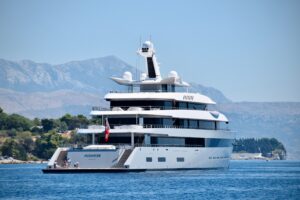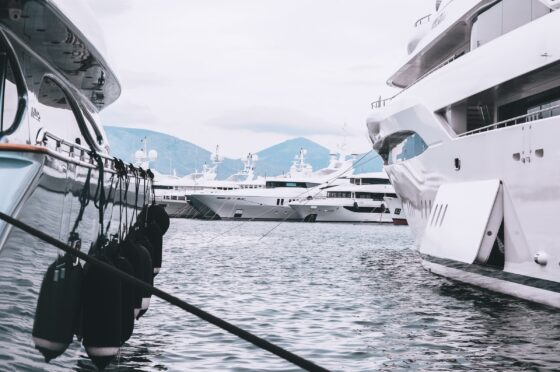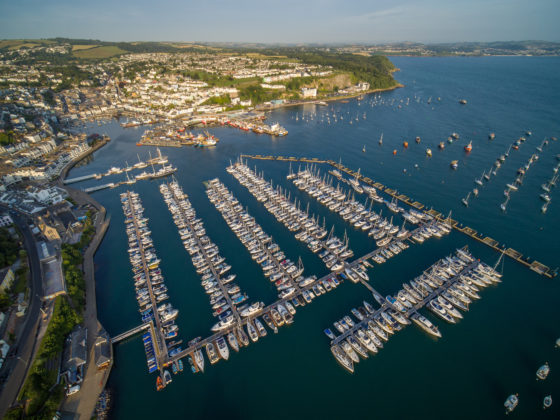
Recycling on superyachts: is the tide turning?

While the extravagance of a luxury yacht does not lend itself easily to eco-friendly living, is the industry beginning to tackle onboard waste and recycling on superyachts more effectively?
One of the most challenging issues for superyacht crew on long journeys is figuring out where to store mounting rubbish without it becoming unhygienic or unsightly. Many large vessels have built-in solutions, including compactors and refrigerated lockers that keep waste from decomposing, but even these can only hold so much.
In recent years, sustainable initiatives and technologies for waste management on yachts and onshore have gained momentum.
UK-based Superyacht Rubbish is one company providing solutions for waste management onboard. Owner David Gates says much of the challenge of waste management starts with storage. The Marinaut vacuum system seals garbage bags and extracts air to reduce their volume by up to 50 per cent, while helping to reduce odour.
Gates says: “One yacht captain told me he loves the fact that he will no longer need to leave hundreds of overfilling rubbish bags on some island somewhere.”
Similarly, Superyacht Rubbish’s GLSand is a small unit that can take wine bottles, beer bottles, glass soda bottles, condiment jars, Champagne and other glass bottles and crush them into a fine sand or grit. “In terms of reuse, the commercial sand has many uses and in the future I hope to provide collection points for this within marinas,” says Gates.

Cleaner marinas
Upon supplying waste management solutions to superyachts, Gates says he discovered a bigger problem – one that he terms “the industry’s dirty little secret”. Superyacht waste is strictly managed when at sea, however when in port, regulations only require marinas and shipyards to provide ‘adequate reception facilities’. This vague term leads to some marinas providing facilities lacking in credible recycling bins or infrastructure. In addition, some contracts that marinas have with their municipal suppliers are not always transparent and can lead to recycling being taken to landfill or burned illegally.
Gates has now launched the Clean Superyacht Marina Campaign – a project aiming to improve facilities within marinas and expand the culture of recycling at marinas and refit yards.
“As an industry, we produce a lot of waste, and we need to get better at dealing with it,” Gates says. “Hopefully, the campaign will help to move this particular industry into a more agreeable space.”
A pressing issue for yachts cruising worldwide is the varying regulations and crossing of country borders, which creates inconsistencies for yacht crew trying to uphold their onboard recycling procedures.
Gates says: “Every country a vessel travels to, sometimes even regions of the same country, have different facilities and regulations.” He recognises that the current situation is not good enough, and says “to tailor onboard operations, the crew need to know what facilities each marina provides. When crew witness all bins being emptied into one truck and taken off, they can understandably lose commitment to recycling.
“Unless we can improve transparency about where it goes, then segregating trash may be a waste of time.”
Zero-to-landfill marinas
Environmental bodies, along with several marina groups, agree an industry-wide minimum level of recycling infrastructure should be standard at all marinas.
At the most basic level, a yacht should be able to offload debris – be that waste that has already been recycled on board or collections of segregated recycling such as plastic, paper, cardboard and glass, in a designated space.
UK and Europe marina network MDL Marinas says it is set on becoming the most sustainable marina operator in the world and has actioned a zero-to-landfill waste policy. To help achieve this goal, MDL partnered with recycling and waste management specialist Suez.

MDL’s Brixham Marina
“Under our new agreement with Suez, no waste will be sent to landfill,” says Joe Walton, MDL’s head of health, safety and environment. “Everything will now be recycled or recovered, delivering a ‘zero waste to landfill’ solution.”
The contract with Suez enables MDL to increase the amount and type of waste it can recycle at its marinas, from food to ferrous metals. These will then be transformed into new products or used to generate electricity.
Food waste at MDL is sent to approved processing sites for anaerobic digestion to generate heat, which in turn drives a generator to harvest electricity. After the material has been used in this way, it is then turned into fertiliser to be re-used again. Glass waste is crushed and recycled, while steel is repurposed as steel wire. Paper, plastic, cardboard and non-ferrous metals, such as aluminium cans, are also recycled.
Other general waste is sent to an energy recovery centre where it is incinerated to generate electricity, which Suez returns to the national grid, or converted into refuse-derived fuel.
Walton says: “What’s more, each new waste bin will be individually microchipped to provide real-time data for each individual collection.
“Being part of the circular economy in this way, as opposed to taking the outdated linear ‘take, make, waste’ approach, we’re able to move in the desired direction of becoming the most sustainable marina operator, ensuring our berth holders are able to enjoy their boating in the most environmentally friendly way possible.”
Customer calls
Andrew Lewis, head of marketing at Premier Marinas, says he is “encouraged by the increasing number of queries” from customers asking how waste is managed at the company’s marina sites. Premier signed a contract with waste management company Veolia in 2020, which it says is helping the marina company ensure as much recyclable material is recovered from waste discarded at its sites as possible.
“A key issue in the UK is that domestic waste and recycling schemes vary a lot from region
to region,” Lewis explains.
“As our customers visit our marinas from across the UK and beyond, they will often have experienced different arrangements at home. Working with a single partner across our sites means we can promote a common approach.
Along with general waste and recycling, the company also provides recycling facilities for hazardous waste, including paint, lead acid batteries, oil filters and spent oil. General waste, including food waste from berth holders’ boats, is recycled, with some directed to energy recovery facilities to generate electricity.
Waste tech
Further technological advances should also enable a more sustainable waste management cycle to become the norm. In the artificial intelligence and robotics field, at-home (or onboard) recycling solutions are picking up pace. Developing technologies use AI sensors to assess if an item is recyclable and how it should be treated. The item is washed and plastic is flaked, glass crushed or metal shredded. This type of system offers many advantages for yachts as it not only aids in the recycling process but also enables the yacht to store a lot more waste onboard.
What is evident is that the marine industry needs to restructure its approach to onboard waste and follow the five Rs; refuse, reduce, reuse, repurpose and finally, recycle.
